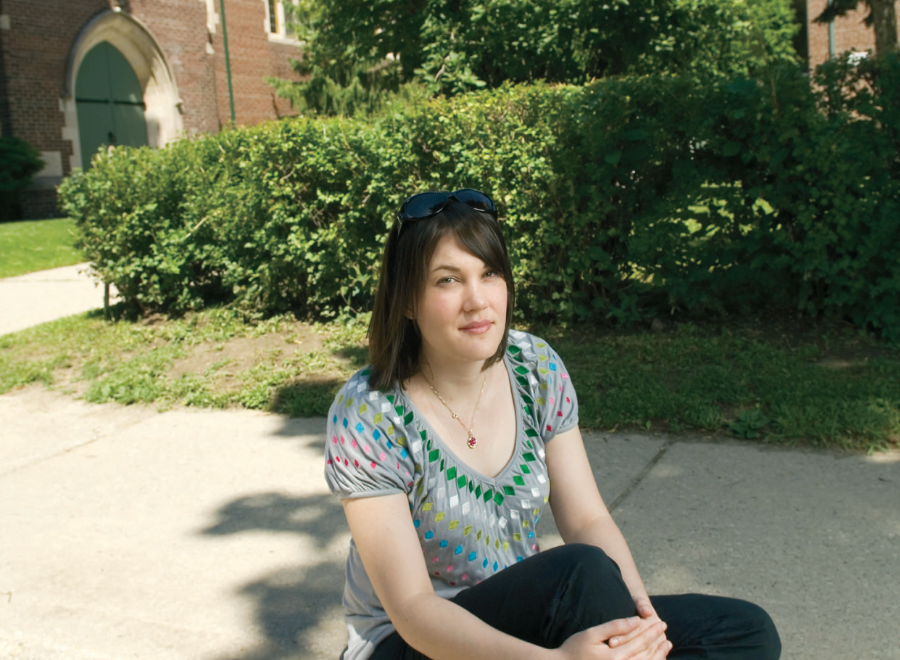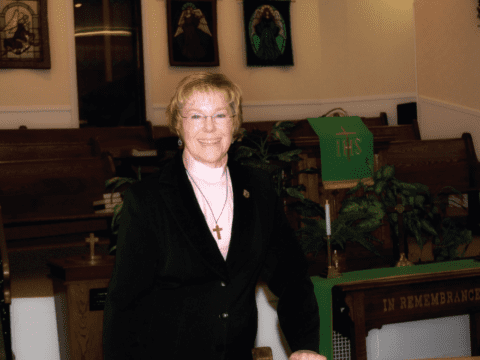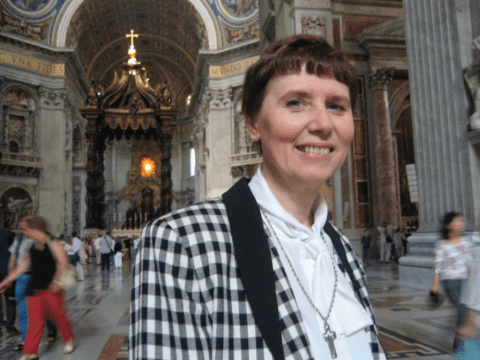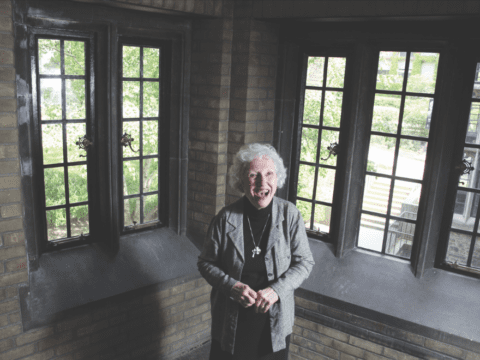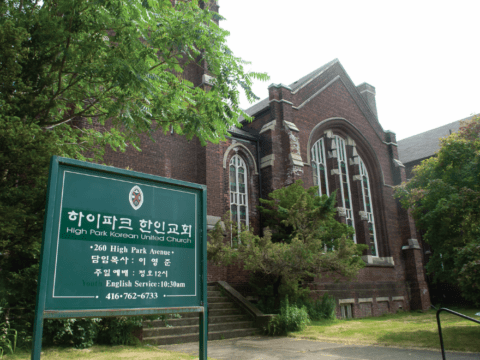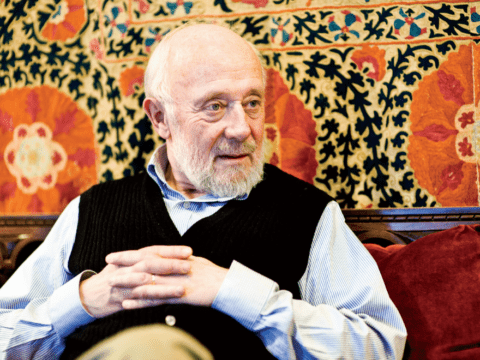I’m walking to church on one of the first beautiful spring days in April. Normally, I would still be in bed, or at least lounging around my apartment in my pyjamas. I haven’t been to church regularly in 15 years.
Growing up, I went to church every Sunday, often twice, because my father was a conservative Presbyterian minister. After I moved away from home, I told my parents that I didn’t believe in God and would not be going to church anymore. But now, I’m giving church another try.
My feelings about Christianity are complicated. As a young person, I felt hurt by the church’s beliefs about women.
Listening to my father preach that women should be “submissive” to men was confusing and painful. I also didn’t accept that homosexuality was wrong, and found it impossible to believe that many events in the Bible actually happened. Afraid to hurt my parents, I kept quiet, and religion became an oppressive force in my life. It was only after I stopped going to church that I finally began to feel free.
On the other hand, the now-disbanded church that I grew up in was interesting. It was a small close-knit group, populated by a mix of characters from all walks of life, all of them eager to learn. Some members were terribly lonely and spent a great deal of time around our dinner table. Once, my father let a homeless man stay overnight at our house. The man ended up stabbing someone (not in our church) several months later.
I admired my parent’s genuine concern and compassion for other human beings, no matter who they were. I admired their non-materialistic lifestyle and their unwavering faith and integrity. I still do.
When I was younger, I was obsessed with whether or not God was real. However, as time flies by, I think about God less and less. Any sense of faith I do have is always fleeting. But I’m starting to think that maybe a strong sense of faith isn’t necessary to go to church. So I’ve decided to return — with an open mind — for five weeks to see what happens. I’m hoping I’ll have a different experience this time.
I’ve chosen the United Church because it’s committed to social justice and seeks to retain the “good” values associated with Christianity, while doing away with the harmful ones.
My parents believe that the United Church offers a watered-down version of Christianity. I don’t agree. But if my parents’ brand of Christianity is the full-strength version, then it’s definitely not for me.
My husband grew up in a downright freaky Pentecostal church where the minister blamed the congregation for not praying hard enough when someone died. Understandably, he has his own issues with religion as a result. We’ve talked about going back to church before, but he’s not exactly overcome with excitement when I tell him about my plans. He does, however, agree to come with me at least once.
Week one
I’ve chosen a church on a residential street close to my Toronto home because it’s convenient. As I enter the church, I’m greeted by a group of white-haired women, handing out bulletins. About 60 people are present, including a few close to my age, and six children.
A visiting minister is preaching today, and her sermon is partially about sin. She makes a joke about this word, which seems to imply that it’s a taboo word in the United Church. Citing the author of a book on the subject, she tells the congregation that humans’ biggest fear is to not exist. This creates anxiety, which isn’t necessarily good or bad, but our response to this anxiety can be sin. “Sin is all the stuff we do to fill that fear space,” she says. She reads several passages from other writers, one of which provides some thought-provoking examples of contemporary sin.
The church’s choir includes a number of elderly women, and I find it a little moving to hear them sing, “Although I walk through the valley of the shadow of death, I will fear no evil.”
Afterward, I ask the minister about the authors she referenced, and she offers me her sermon notes, which I take from the pulpit. On my way down, I run into the regular minister, also a woman. As we’re talking, she puts her arm lightly around me for a second. She seems warm and friendly, but low-key.
I walk home, thinking about the service. The message wasn’t meaningless; in fact, it was even inspiring. I felt fairly comfortable in the church, and the people were nice. It was a pleasant experience. Maybe it will be possible for me to return to church on a more permanent basis.
Week two
The next Sunday, I ride my bike to a church located downtown. As I enter the building, I’m confused about where the church service is, so I ask the first person I see — a man wearing a flowing shirt with a green and yellow tie-dye print.
He tells me that two church groups operate out of this building. One of these services won’t take place for a few hours because the church is hosting a special service today. He is the minister of the other, “sort of alternative” church in the cheery-looking room beside us. I decide to go to this church, which turns out to be heavily focused around the environment and social justice.
Roughly 25 people sit in chairs surrounding a table with a myriad of objects on it, including flowers, chimes, a sparkly piece of rock and a candle. The minister speaks for a while, and then we break into groups to discuss the church’s eco-covenant. I join the group that’s reviewing the covenant’s practical commitments. The man next to me starts the discussion by suggesting we don’t need to shower every single day. Thankfully, this does not get added to the list of practical commitments.
We move on to talking about things like tankless water heaters and windmill farms, before the minister asks if there is consensus in each group — there is. “Consensus, how dull,” says the man who suggested showering less.
Later in the service, we pass around objects representing earth, water, air and fire. A large bottle of soapy solution represents air, and people take turns blowing bubbles. Later, we chant: “Touch the earth, love the earth; Breath the air, love the air; Feel the fire, love the fire; Wash in the water, love the water.”
Everyone I meet is smart, down-to-earth and funny. A friendly woman around my age invites me to stay for refreshments, and I feel comfortable enough to do so (I didn’t at the last church). She explains that the service is informal and interactive, and there’s usually a discussion afterward. Today, however, the discussion was cancelled because of an Earth Day rally. Before leaving, I also chat with the no-shower man, I feel completely at home at this church, but I’m not sure if the spiritual aspect is what I’m looking for. On the other hand, I’m not sure what I am looking for.
Week three
My husband comes with me this time. Since we’re moving to Toronto’s east end soon, I turn to the Internet to find a church within walking distance of our new apartment. This church is more traditional, partly because of the message but also because of the overbearing, ominous-sounding organ. The physical space is quite large, but just 35 people are present. The empty pews and dark interior create a heavy, almost depressing atmosphere. “I need a Red Bull,” whispers my husband.
Part of the minister’s message, based around a Scripture passage, is that God remains largely unknown to us. We learn more about this unknown God through the life of Jesus and by doing God’s work. The message has substance, but we skulk out the door as soon as the service ends.
“It was a little old, stale and stuffy,” says my husband. “I wouldn’t want to do that every Sunday.”
He refuses to elaborate on his thoughts because he fears being quoted in this article. “Don’t use my comments to avoid saying what you really think,” he says.
Week four
This week, I select another church downtown. The stained glass widows, hanging banners and light wood interior make this the most beautiful place of worship so far. The congregation of about 100 people is somewhat racially diverse, and the parishioners come across as sophisticated and educated.
Today happens to be Ascension Day Sunday, and a member of the congregation — a former Buddhist monk — is delivering the message. He explains that we may have reached a point in history where Christians no longer have to choose between being fundamentalist or spiritually anemic. In the pre-modern era, Christians were stuck in “mythic consciousness” and took sacred myth literally, he says. Then, in modern era, we rationalized sacred myth into nothing. But in postmodern times, we may be entering an era where sacred myth is viewed as a living language of the soul; a way of communicating the deepest truths of life. He concludes by asking what kind of Christians we want to become. “What does our sacred myth really have to offer?” he asks.
I’d like to return to this church, at least occasionally, to hear more sermons like this.
Week five
My original plan was to attend four services and then return to the church that I liked most on the fifth Sunday. However, I’m having trouble picking a church. By Saturday night, I still haven’t made up my mind. Eventually, I revise my plan and decide to revisit three of the four churches again, beginning with the first church.
This time, the regular minister is preaching. During her sermon she talks about a small group of people who continued to gather in worship after Jesus was gone, even though they saw no evidence of their God.
As I’m sitting in my pew, I think about how these people had the benefit of actually knowing Jesus. Continuing to gather in worship in any meaningful way is more difficult in 2008, when everything around you seems to suggest that God does not exist, and you’ve only read about Jesus in a book.
I leave this church feeling disheartened. I am skeptical by nature. That’s not about to change. So what is the point of this experiment? I’m feeling more confused than ever. Apart from this, I have a more pressing concern. How the heck am I going to end this article?
In an act of desperation, I email the minister of this church and arrange to meet her for lunch. Over a bowl of soup, she laughs when I start our conversation by asking if she believes in God (she does). She patiently provides non-formulaic answers to my questions. It turns out that she is also the daughter of a conservative minister and had a “mixed” early experience with Christianity.
She encourages me to continue exploring because I’m obviously doing all this for a reason. Growing in faith is a process and you won’t become perfect overnight, she says. But when you do experience moments of faith, try to stop rationalizing these moments away.
We part ways after nearly two hours. Since I’m moving to a different area of Toronto, she recommends two churches in my new neighbourhood. I plan to keep in touch with this minister and to visit these churches when I move.
After five weeks of church, I’ve experienced no Saul-on-the-road-to-Damascus moment. But that’s no surprise. What gives me hope is that my pea-sized sense of faith does seem to be growing. All things considered, that’s a pretty good start.
***
This story first appeared in The United Church Observer’s October 2008 issue with the title “I’m giving church another try.”

